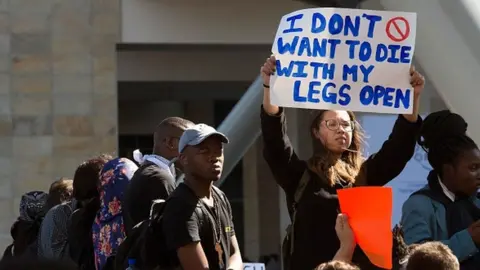South Africa anti-rape protesters target business leaders in Cape Town
Hundreds of protesters, mainly female, in South Africa, have tried to storm a conference centre in the coastal city of Cape Town where the World Economic Forum (WEF) event is being held.
They were calling for protection of women against sexual abuse and also justice for victims.
The march comes amidst national anger over the killing of a 19-year-old student.
Femicide in South Africa is five times higher than the global average.
More than 20,300 murders were recorded last year alone.
One of the latest victims, Uyinene Mrwetyana, 19, a student at the University of Cape Town, was allegedly bludgeoned to death after going to pick up a parcel from a post office in the Cape Town suburb of Claremont.
The first-year film and media studies student had been missing since 24 August and her body was found a week later dumped in Khayelitsha township.
The confirmation of her identity triggered a national outrage about the safety of women.
A suspect in the killing of Ms Mrwetyana, who cannot be named yet for legal reasons, appeared in court on Monday and, according to the prosecuting authority, confessed to the killing. He is expected back in court in November.

Gender violence in South Africa
- One in five women are assaulted by their partner
- More than 40,000 cases of rape are reported every year, most of the victims are female
- Femicide in South Africa is five times higher than the global average
Source: Medical Research Council 2009 study; Stats SA Demographic and Health Survey 2016

Women have been using hashtags #RIPUyinene and #AmINext to share their stories and call for action to be taken to end abuse against them.
President Cyril Ramaphosa called violence against women a "stain" on the country:
"This is a very dark period for us as a country. The assaults, rapes and murders of South African women are a stain on our national conscience," he said in a statement.
 AFP
AFPOutside the Cape Town International Convention Centre, where the two-day WEF event opened today, protesters chanted "we want a state of emergency", urging President Ramaphosa to take immediate actions on the situation.
"People feel that they are entitled to our bodies and they aren't... I'm here to fight for the people who never had a chance to fight for themselves," a protester told the BBC's Vumani Mkhize.
The presidential special adviser on gender-based violence, Dr Olive Shisana, told the protesters that the government had a plan to address their concerns:
"Our team is still going around the country where we are consulting women on the strategy to fight gender-based violence. We cannot develop it within the Presidency without involving women all around the country."
The protesters were not however convinced by her comments, EWN news site reports.
